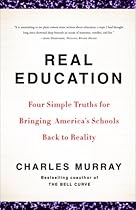
Real Education by Charles Murray should be required reading for all education majors and teachers. It addresses some of the fundamental problems with our educational system today. It focuses on the fact that not everyone in going to excel academically, and that we shouldn’t try to force everyone too. People have different areas of strengths and we should encourage students to focus on those areas while learning basic knowledge in other areas. He believes that only the top 10 to 20 percent of students should really go to universities, because they are the only ones who really benefit from because they are the ones who want to excel academically. Other students should be encouraged to attend post-secondary vocational schools or pursue certifications. If you can pass the CPA exam after taking a few classes at a community college, why do you need a four-year degree? If you graduated from Harvard because you took all the easy classes and you can’t pass a certification to become a marketing professional, then that’s too bad. Certification programs would help level the playing ground and keep so many students from drowning in debt to attend college. The top students who would attend universities would be able to learn more because they’d be surrounded by people who want to be there learning, not just partying, and wouldn’t get made fun of for their study habits. And for students who excel at working with their hands or building things, such as mechanics or welders, encourage them to attend vo-tech during high school and let them get to work as soon as they graduate. Don’t treat them like second-class citizens or idiots because they didn’t go to college or don’t want to go to college. Don’t push them in that direction when they’d be happier and actually make more money going in to something like welding. Why do we ridicule these types of positions? Many blue collar workers can pull in $100,000 a year. Why don’t we tell high school students that? Why don’t we encourage them to pursue those fields instead of focusing only on college?
My brother hated school. Hated it. My mom would literally have to sit on him to get him to do his homework. Me, on the other hand, loved school. I’d make up assignments for myself and play school in the summers. In the years when I had crappy teachers, I couldn’t wait to get home to read and teach myself. (Yes, I was a giant nerd and still am because I totally still do that, but that’s not the point of the story.) We are very different people. I attended a great college for my BA and went on to get my MA. My brother took vo-tech classes in high school. He now has a good job, and no college debt. I don’t have college debt either, but I’m a very rare exception, especially because I went to an expensive private school. It would be feasible for me to have more student loan debt than I make in a year. For many of my classmates, that’s true. OBU cost about $16,000 when I went there (I think it’s at least 20 now). That’s $64,000 for four years. Many of my classmates majored in fields such as ministry and education. Not exactly fields known for their large incomes. How long is it going to take them to pay that money back? Was it worth it? They may have loved the experience and liked their classes, but how many of them really learned enough to make that worth it? I know from having classes with these people that it sure didn’t seem like they learned that much. Most of those people end up leaving before graduation, but how much did they spend on freshman year alone? I feel myself getting on my soap box and this post could go on for a long, long time, so I will wrap it up by saying that if you’re interested in education or are an educator or parent, read this book.
No comments:
Post a Comment